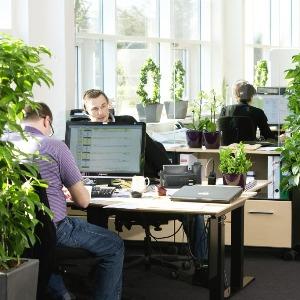Pitch
Using food remains of employees as fertilizer for plants around the office, potentially giving working spaces a healthy and positive mood.
Description
Summary
Problems:
PROBLEM 1 - WASTE
- Naturally, employees may be unable to finish the food they eat at work, and hence throw food remains into the rubbish
- Those remains are potentially wasted as their reuse can't be guaranteed (except if an office operates a composting system, for example)
PROBLEM 2 - FINANCIAL LOSS BECAUSE OF LOW PRODUCTIVITY LEVELS AND SICK LEAVES PARTIALLY CAUSED BY CONDITIONS OF THE WORKPLACE
- Some offices are crammed or short on space which can make them productivity-wise less encouraging for employees
- Employees can have low productivity levels due to constantly feeling uncomfortable at their workspaces, potentially resulting in their moving around every now and then or their having low concentration, and consequently, productivity levels
- Employees take sick leave when they don't feel well enough to work. A working space that isn't well ventilated, for instance, can negatively affect employees' wellness, playing a role in their need for sick leave
Proposal:
A system that employers can follow to:
- Collect food remains of employees at low cost
- Compost said food remains using low cost tools and methods, in the office
- Grow and maintain plants in work spaces, as suited to the office's needs (e.g. needs based on space size, number of windows, amount of sunlight available, whether some employees have allergies towards certain plants or not etc)
- Gain a potentially more productive and healthy working space
- Potentially reduce financial losses resulting from employees' lost time in-office and sick leaves [1], through providing a comfortable and healthy working space
Sources:
Is this proposal for a practice or a project?
Practice
What actions do you propose?
- Measure current employee productivity (through using your method for measuring amount of work produced within a certain period of time, or through measuring the amount of work produced each week, for instance, using a method such as that of counting the number of assigned tasks handed in on time per week/month) and sickness levels (by counting number of sick days employees take per month/year)
- Collect food remains of employees through asking employees to throw their remains into a special bin, as opposed to the rubbish bin. An announcement can be made beforehand to ensure minimal waste is lost. The announcement should explain how employees' contributing to this practice can benefit from it.
- Have maintenance staff collect enough food remains to start composting to grow the first batch of plants
- Choose plants based on your office's needs. What you should consider includes workspace size, number of windows, amount of sunlight available, available frequency and time for maintenance of plants, availability of maintenance staff for maintaining plants (e.g. watering, fertilizing) and employees' allergies (to certain plants)
- Have maintenance staff maintain plants, allowing plants to grow and create the improved environment you're aiming for.
- Measure employee productivity and sickness levels again to observe how this practice affects productivity, and hence efficient use of financials.
Who will take these actions?
- Employers (e.g. office managers) – they are the leaders of such a practice. They start the initiative, overlook it, make sure it works and measure pre- and post- productivity and sick levels (and consequently financial productivity).
- Maintenance employees – they learn about composting, carry it out and maintain the plants
- All employees – they provide their food remains and can directly benefit from the practice
The employers and employees are both beneficiaries – employers benefit from potentially reduced financial loss and employees gain the benefit of a potentially more comfortable and healthier workspace.
Where will these actions be taken?
No specific scale or geographical location has been defined (yet) but these actions would be best suited for offices in countries which produce the most food waste.
According to the World Economic Forum, "per capita food waste by consumers (not including the production process) in Europe and North America is around 95-115kg per year" so Europe and North American countries would be good choices for a trial implementation of the proposed practice.
In addition, specify the country or countries where these actions will be taken.
United States
Country 2
No country selected
Country 3
No country selected
Country 4
No country selected
Country 5
No country selected
